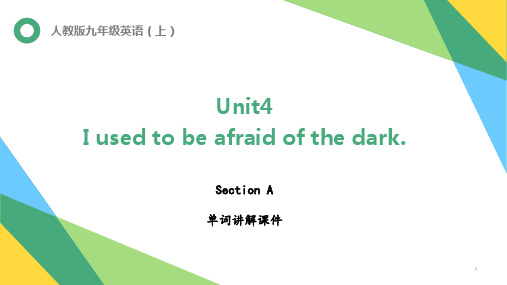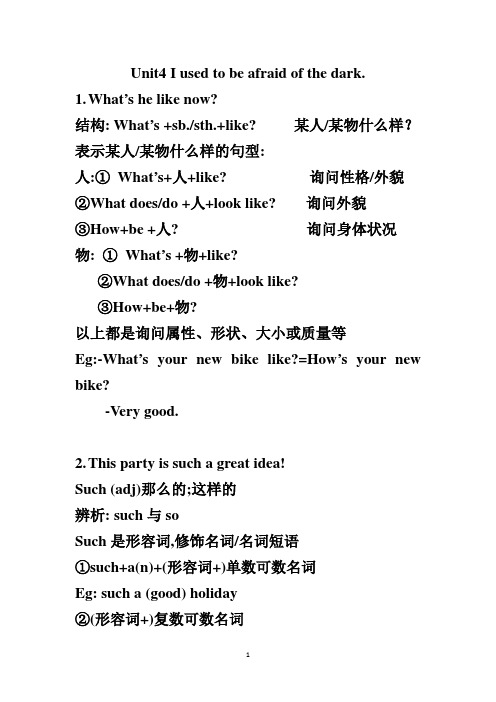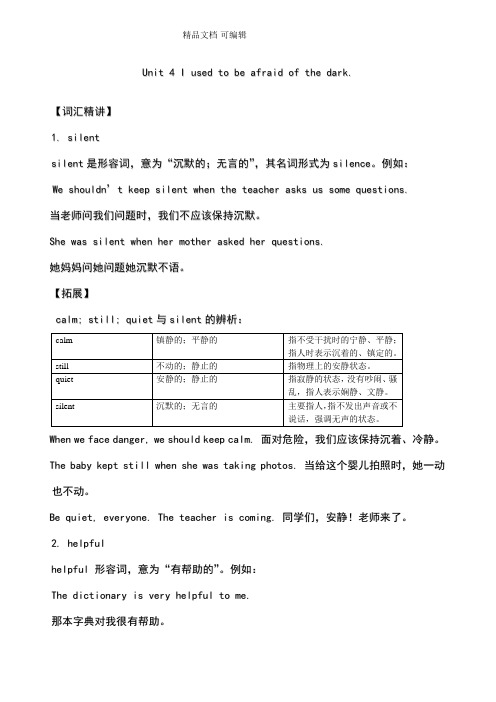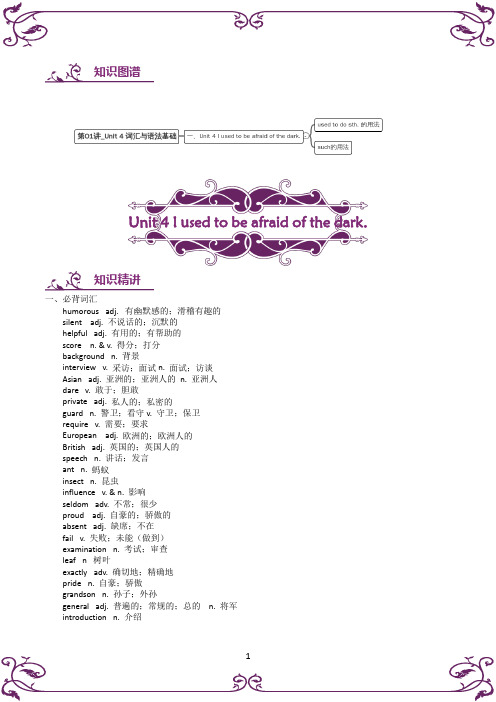人教版九年级英语unit4词汇讲解
Unit4sectionA单词讲解课件人教版九年级英语

原文:As she got better, she dared to sing in front of her class,and then for the whole school.
【搭配】how dare you 你敢;胆子真大啊 dare to do sth 敢于做某事
【例句】 How dare you talk back to me! 你竟敢和我顶嘴!
11
原文:Candy told me that she used to be really shy and took up singing to deal with her shyness. 【搭配】deal with应对:处理
a great deal of 许多 big deal 了不起的事 Deal ! 成交! 【例句】He's happy that I deal with it myself. 他对我自己处理这件事感到很满意。
6
原文:She still plays the
from time to time.
【例句】 The baby cries from time to time. 这个宝宝时不时地哭。
7
原文: He studied hard He won this year's title with a score of 9.687. 他以9.687分赢得本年度的冠军
background
n.背景 European
adj.欧洲(人)的n.欧洲人
interview
v. 采访;面试n.而试;访谈 African
adj.非洲(人)的n.非洲人
Asian
adj.亚洲(人)的n.亚洲人 British
adj.英国(人)的
人教版九年级全一册英语Unit4 Section A Grammar Focus4c

adj. 非洲 (人)的 n. 欧洲人 n. 非洲人
_J_e_rr_y__u_s_e_d_t_o_r_e_a_d__b_o_o_k_s_o_n__E_u_r_o_p_e_a_n____
_h_is_t_o_r_y_. S__h_e_d_i_d_n_’_t_u_s_e_t_o_r_e_a_d__b_o_o_k_s_o_n___ _A_f_r_ic_a_n__c_u_lt_u_r_e_. ______________________
A. to drive; to drive
B. driving; driving
C. to driving; to drive
D. to drive; to driving
典例精析
2. This kind of cloth is used _________ dress. A. to making B. to make C. to be made D. making
Unit 4 I used to be afraid of the
dark.
Section A (Grammar Focus-4c)
学习目标
➢ Key words & phrases:
European, African, British, speech, public, in public
➢ Key sentences:
1. Emily used to listen to pop music, but now she enjoys country music.
2. Emily used to watch scary movies, but now she hates scary movies.
人教版英语九年级全册单元unit 4 知识点+测试卷+思维导图

Unit 4 I used to be afraid of the dark.1.重点词汇score, background, guard, speech, public, ant, examination, pride, introduction, interview, dare, require, influence, fail, humorous...2. 短语归纳:ed to do 过去常常做2.deal with 对付;应付3.be proud of 为……骄傲,感到自豪4.take pride in 为……感到自豪5.from time to time 时常,有时6.in public 公开地7.in person 亲身,亲自8.take up sth 开始做,接受,占用9.not…anymore 不再10.worry about 为……担忧11.hang out 闲逛12.think about 考虑13.be alone 独处14.on the soccer team 在足球队15.no longer 不再16.make a decision 做决定17.to one’s surprise 令某人吃惊的是18.even though 尽管19.pay attention to 对……注意,留心20.in the last few years 在过去的几年里3. 必背典句:1. I used to be short. 我过去很矮。
2. I didn’t use to be popular in school. 我过去在学校不受欢迎。
3. -You used to be short, didn’t you? 你过去很矮,是吗?-Yes, I did./No, I didn’t. 是的,我是;不,我不是。
4. -Did he use to wear glasses? 他以前戴眼镜吗?-Yes, he did./ No, he didn’t. 是的,他是;不,他不是。
Unit4讲义 人教版英语九年级全册

Unit4 I used to be afraid of the dark.1.What’s he like now?结构: What’s +sb./sth.+like? 某人/某物什么样?表示某人/某物什么样的句型:人:①What’s+人+like? 询问性格/外貌②What does/do +人+look like? 询问外貌③How+be +人? 询问身体状况物: ①What’s +物+like?②What does/do +物+look like?③How+be+物?以上都是询问属性、形状、大小或质量等Eg:-What’s your new bike like?=How’s your new bike?-Very good.2.This party is such a great idea!Such (adj)那么的;这样的辨析: such与soSuch是形容词,修饰名词/名词短语①such+a(n)+(形容词+)单数可数名词Eg: such a (good) holiday②(形容词+)复数可数名词Eg: such (beautiful) girls③(形容词+)不可数名词Eg: such (delicious) foodSo是副词,修饰形容词/副词Eg: so careful so carefully注意: 当名词前有many,much,few,little 等词修饰时,只能用so,不能用such.Eg: She will have so much housework to do tomorrow Such+a(n)+adj+可数名词单数=so+adj+a(n)+可数名词单数Eg:It is so interesting a book that I like it very much. It is such an interesting book that I like it very much.3.As she got better,she dared to sing in front of her class,and then for the whole school.dare (实义动词) 敢于;胆敢(可以有词形变化) Eg: I wonder how he dares to say such things.dare(情态动词) 敢(通常用于疑问句/否定句及if/whether之后,一般不用于肯定句)Eg:Dare you tell her the truth?I don’t know whether he dare try.“I dare say”习惯说法(用于肯定句) 所表示的是一种不确定的语气,常译为:很可能、大概、我想等Eg: I dare say you are right. 我想你是正确的4.Now she’s not shy anymore and loves singing in front of crowds.Not...anymore=not...any more 相当于no more(一般指行为/动作不再出现)辨析: not...any more 与not...any longernot...any more 相当于no more,表示数量和程度上的“不再”,通常修饰非延续性动词,一般指今后“不再”,故多用于将来时Eg: He will not go there any more.He will no more go there.not...any longer 相当于no longer 指时间上/距离上的“不再延长”,通常修饰延续性动词,多指现在的情况与过去相比,故常用于现在时态Eg: You can’t stay here any longer.You can no longer stay here.5.You really require a lot of talent and hard work to succeed.require (v) 需要;需求requirement (n)要求;规定用法如下:①require sb.to do sth. 要求某人做某事②require that+sb.(should) do sth. 要求某人做某事③sth. require doing /to be done.某事需要(被)做6.Only a very small number of people make it to the top.a very small number of 极少数后接复数名词(谓语动词用复数形式) a small number of 少数辨析: a number of 与the number ofa number of +复数名词许多the number of +复数名词...的数量(谓语用单数) 7.Sometimes he was absent from classes and failed his examinations.absent (adj) 缺席的;不在场的(常与from连用) be absent from 缺席absence (n) 缺席(反义词: presence )present(adj)出席的;在场的(后置定语)(adj)目前的;现在的(前置定语)fail (vt) 失败;不及格(vi) 失败;不及格~ to do sth. 未能/没能做成某事Eg: The boy didn’t fail (in) the exam.8.She advised them to talk with their son in person. advise sb. (not) to do sth. 建议某人(不)做某事advise的用法如下:①~doing sth. 建议做某事②~ that +从句建议... (that引导的从句应用虚拟语气,即:should+动原,should可以省略)advice(un) 建议;忠告 a piece of advice 一条建议9.So he became less interested in studying and missed classes.辨析: become,turn与getbecome:变得;成为(通常指身份、职位的变化,强调变化的过程已完成)Eg: She became an English teacher.turn: 变成(多用于在颜色或性质等方面的变化,强调变化的结果)Eg: The man turned blue with fear. (那个人吓得脸色发青)get:变得(多用于口语,表示一种变化过程,强调“渐渐变得”, 其后常接adj的比较级)Eg: In winter,the days get shorter.Used to的用法:used to+动原表示过去的习惯性动作或状态,现在已不再发生或不存在.否定句: used not to, usedn’t to, didn’t use toEg: She didn’t use to have long hair.She usedn’t to have long hair.一般疑问句: Did e to...? /Used sb.to...?Yes,sb.did. /Yes,ed to. No,edn’t 反意疑问句: 附加问句部分可用didn’t/usedn’t类似短语:be/get/become used to doing sth.习惯于做某事be used to do sth. 被用于做某事。
人教版九年级英语第四单元知识讲解

U n i t4I u s e d t o b e a f r a i d o f t h e d a r k.【词汇精讲】1.s i l e n ts i l e n t是形容词,意为“沉默的;无言的”,其名词形式为s i l e n c e。
例如:W e s h o u l d n’t k e e p s i l e n t w h e n t h e t e a c h e r a s k s u s s o m e q u e s t i o n s.当老师问我们问题时,我们不应该保持沉默。
S h e w a s s i l e n t w h e n h e r m o t h e r a s k e d h e r q u e s t i o n s.她妈妈问她问题她沉默不语。
【拓展】c a l m;s t i l l;q u i e t与s i l e n t的辨析:W h e n w e f a c e d a n g e r,w e s h o u l d k e e p c a l m.面对危险,我们应该保持沉着、冷静。
T h e b a b y k e p t s t i l l w h e n s h e w a s t a k i n g p h o t o s.当给这个婴儿拍照时,她一动也不动。
B e q u i e t,e v e r y o n e.T h e t e a c h e r i s c o m i n g.同学们,安静!老师来了。
2.h e l p f u lh e l p f u l形容词,意为“有帮助的”。
例如:T h e d i c t i o n a r y i s v e r y h e l p f u l t o m e.那本字典对我很有帮助。
h e l p f u l是由动词h e l p加后缀“-f u l”构成的形容词。
动词加后缀“-f u l”变成形容词,是一种常见的构词法,类似的这样的词还有很多。
人教版九年级上册英语 Unit 4 词汇与语法基础(解析版) (1)

知识图谱Unit 4 I used to be afraid of the dark.知识精讲一、必背词汇humorous adj. 有幽默感的;滑稽有趣的silent adj. 不说话的;沉默的helpful adj. 有用的;有帮助的score n. & v. 得分;打分background n. 背景interview v. 采访;面试n. 面试;访谈Asian adj. 亚洲的;亚洲人的n. 亚洲人dare v. 敢于;胆敢private adj. 私人的;私密的guard n. 警卫;看守v. 守卫;保卫require v. 需要;要求European adj. 欧洲的;欧洲人的British adj. 英国的;英国人的speech n. 讲话;发言ant n. 蚂蚁insect n. 昆虫influence v. & n. 影响seldom adv. 不常;很少proud adj. 自豪的;骄傲的absent adj. 缺席;不在fail v. 失败;未能(做到)examination n. 考试;审查leaf n 树叶exactly adv. 确切地;精确地pride n. 自豪;骄傲grandson n. 孙子;外孙general adj. 普遍的;常规的;总的n. 将军introduction n. 介绍二、重点词汇1. humorous adj.funny, or making you laugh幽默的;滑稽的例句:Her latest book is a humorous look at teenage life.她的新书是对青少年生活的一种幽默审视。
2. interview v.1). a meeting in which someone asks you questions to see if you are suitable for a job or course面试;面谈例句:I had an interview for a job with a publisher.我参加了一家出版公司的求职面试。
人教版九年级上册英语 Unit 4 词汇与语法基础(解析版)

知识图谱Unit 4 I used to be afraid of the dark.知识精讲一、必背词汇humorous adj. 有幽默感的;滑稽有趣的silent adj. 不说话的;沉默的helpful adj. 有用的;有帮助的score n. & v. 得分;打分background n. 背景interview v. 采访;面试n. 面试;访谈Asian adj. 亚洲的;亚洲人的n. 亚洲人dare v. 敢于;胆敢private adj. 私人的;私密的guard n. 警卫;看守v. 守卫;保卫require v. 需要;要求European adj. 欧洲的;欧洲人的British adj. 英国的;英国人的speech n. 讲话;发言ant n. 蚂蚁insect n. 昆虫influence v. & n. 影响seldom adv. 不常;很少proud adj. 自豪的;骄傲的absent adj. 缺席;不在fail v. 失败;未能(做到)examination n. 考试;审查leaf n 树叶exactly adv. 确切地;精确地pride n. 自豪;骄傲grandson n. 孙子;外孙general adj. 普遍的;常规的;总的n. 将军introduction n. 介绍二、重点词汇1. humorous adj.funny, or making you laugh幽默的;滑稽的例句:Her latest book is a humorous look at teenage life.她的新书是对青少年生活的一种幽默审视。
2. interview v.1). a meeting in which someone asks you questions to see if you are suitable for a job or course面试;面谈例句:I had an interview for a job with a publisher.我参加了一家出版公司的求职面试。
Unit4重要知识点讲解人教版九年级英语

Unit4 I used to be afraid of the dark.重要知识点讲解Section A_Grammar Focus_Section B_综合Section A一、used to do sthI used to be afraid of the dark.我以前怕黑。
[点拨]"used to do sth."意为“过去常常做某事”;表示过去经常性或习惯性的动作或状态,暗指现在已经不存了,强调过去与现在的对比。
used to的否定形式有两种:didn’t use to或us edn’t toMrs Brown didn’t use to / usedn’t to travel in summer.布朗夫人过去夏天不旅游。
used to用于疑问句时,要借助助动词did,也可以将used提到主语前。
Did you use to/Used you to play the guitar? 他过去弹吉他吗?Grammar Focus一、某人描述过去某一状态的表达I used to be short.我以前矮。
[点拨]"主语+used to be+形容词."用于某人描述过去某一状态。
二、used to的句式变化[点拨]1.否定句:主语+didn’t use to/usedn’t to do sth.2.一般疑问句:Did+ 主语+ use + to do…?答语:Yes, sb did./No, sb didn’t.Did he use to wear glasses? 他以前戴眼镜吗?Yes,he did.是的,他戴。
3.反意疑问句:主句+ didn’t+人称代词?You used to be short, didn't you?你以前很矮,不是吗?Section B重点短语和表达boarding school寄宿学校in person 亲自be proud of=take pride in 为...感到自豪make a decision 做决定be absent from 缺席look after=take care of 照顾;照看单元综合:1.quiet/calm/silent/still/peaceful这些形容词均含“平静的,无声无息”之意。
- 1、下载文档前请自行甄别文档内容的完整性,平台不提供额外的编辑、内容补充、找答案等附加服务。
- 2、"仅部分预览"的文档,不可在线预览部分如存在完整性等问题,可反馈申请退款(可完整预览的文档不适用该条件!)。
- 3、如文档侵犯您的权益,请联系客服反馈,我们会尽快为您处理(人工客服工作时间:9:00-18:30)。
12. let sb.down 让某人失望/沮丧
Please don’t let me down. 13. come up with 想出,提出=think of
He comes up with a good idea. 14. rest n.其余
the rest 做主语时,若代替可数名词复数,谓 语用复数,若代替不可数名词,谓语用单三。
In our class,some students are drawing and the rest are reading.
There is 10 yuan in the wallet.Four yuan is for you,and the rest is for me. the rest of +n.做主语,谓语动词的数应与of后的名 词的数保持一致。
❖
He did a good deal of research on this subject. ❖ research vi. “对…进行研究“,后接介词 into
❖ He is researching into the cause of cancer. 4. tie n.领带
He wears a blue tie. tie v.系,拴,绑 现在分词 tying tie….to…把…系到…上
come短语大聚会 come back回来 come from来自 come over顺便来访 come across 偶然遇到 16. cover…with…用…盖住
Don’t cover his face with the book. cover作名词,意为“盖子,封面”
I really like the cover of the book. 17. offer v.用作及物动词,有(主动)拿给,
给予的意思,相当于give,后可接名词或代 词作宾语,也可接双宾语,即offer sb. sth=o书破万卷,下笔如有神--杜甫
The rest of the workers are from countryside. The rest of the food has gone bad. 15. come out ⑴ 出版,发表
This magazine comes out once a week. ⑵开花
I think the rose will come out next week.
Unit 4
lion 百万 There are two million people in the city.
2.medical adj.医学的,医疗的 He is a medical student.
medicine n. 药物 3.research n.研究,不可数名词 常与do,make等连用,表示“做或进行研究工 作”,其后可接介词on,in,into,for等表示 研究的内容。
=The old lady does not feel tired at all. 11. plenty of 很多的,后接可数名词复数或
不可数名词均可,通常用于肯定句或否定句 中。疑问句中则用enough,much或many.
Is there enough money? a number of+可数名词复数
8.permission n. 允许,许可,准许 不可数名词 ask for permission 请求许可 with (one’s) permission 经过(某人的)许可 without (one’s) permission 未经(某人的)许可
He did it without permission. 9. bother v.使恼怒
confidence n.自信 have confidence in sth. 对某事有信心 =be confident of sth.
confidently adv.自信地 7. energetic adj.有活力的,精力充沛的 He is an energetic man.
energy n.精力,活力 She is full of energy.
5. what if 表示询问或提建议,相当于what should I do if….?
What if there is no water on the earth?
辨析 what if
what about
what if + 句子
what about + n./v-ing
6. pimple 小脓包,丘疹
vt.使烦恼 + n./pron. vi. 烦恼,费心,与about/with 连用
bother with sth.为某事费心
Don’t bother him!
10. not….in the slightest =not …at all 根本不
The old lady does not feel tired in the slightest.
get pimples 长痘,起疙瘩
7. confident adj. 自信的,有把握的
be confident of sth./that….对…有信心,确 信…
She is confident of passing the exam. =She is confident that she can pass the exam.
